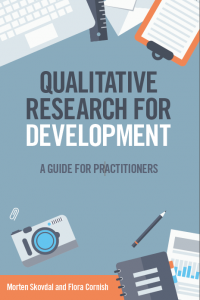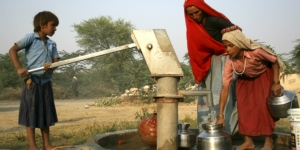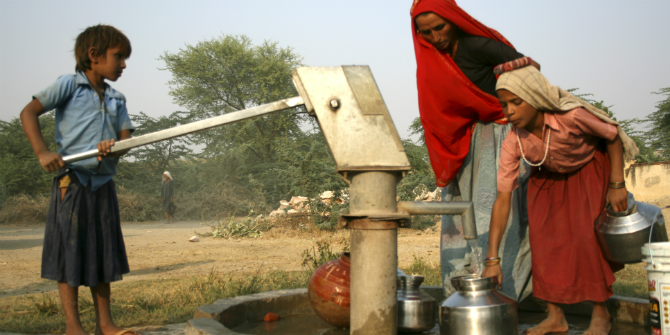Image credit: Save the Children (Flickr CC BY-NC-ND 2.0)
Images of unused donor-funded agricultural machinery rusting in a field, or stories of the most advantaged people in a community benefitting from a development programme are clichés of the failures of development programmes to take account of local contexts when trying to change them. Although they are clichés, they are still all too common.
A paper published in the Lancet in 2014 reported on a cluster randomized trial, in 100 villages, of a massive latrine building programme in Odisha, India. Although latrine coverage increased from 8% to 63% in the intervention villages, there was no evidence of reduced contamination of water, or of an impact on diarrhoea. It appeared that some households eligible for a latrine did not build them, and many people did not use latrines once they were built. The main conclusion of the study was that “the health benefits generally associated with sanitation cannot be assumed simply by construction of latrines.”
To any development practitioner or researcher with a basic knowledge of ‘people-centred development’, this conclusion is unsurprising. Good quality development programming would have meant undertaking in-depth local formative research to understand existing practices, norms, preferences and context. Participatory engagement of communities would have sought to establish the most appropriate and acceptable design of latrines and their siting, to make them most likely to be used. Process and participatory evaluation would have enabled trouble-shooting as the programme developed.
In other words, qualitative research should be a key component of the planning, design, development and evaluation of development programmes. Matching programmes to local needs, context, and preferences is essential if they are to succeed. Qualitative research offers a set of tools for systematically assessing the context of a programme and local people’s perspectives, so that the programme can be tailored to the local context. Participatory research methods facilitate community ownership.
After the completion of the latrine trial, the research team conducted a focus group study to try to understand local perspectives on sanitation. A raft of important findings emerged. For many women, evening excursions to open defecation sites were occasions for relaxing and socializing. Men experienced no inconvenience or shame regarding open defecation, and often considered that latrines should be reserved for women, for whom privacy was seen to be more important. Washing was important to everyone, and so, defecating by an open water course was preferable to sourcing a bucket of water to bring to the latrine. All crucial information for the prospects of a successful sanitation programme. From the point of view of a qualitative researcher, or a person-centred development practitioner, this research should have been done before the latrine-building programme and trial were initiated, to inform a better latrine programme.
These are the reasons why my colleague Morten Skovdal and I have just published a qualitative methods textbook for development practitioners. Having worked in development, humanitarian action and global health in collaboration with local and international NGOs over the past 15 years, we have seen the value of qualitative research in creating better-designed programmes, in listening to the voices of marginalized communities, and in evaluating what went right or wrong so that we can learn from experience.

Our development colleagues have also kept us on our toes, and forced us to continually re-think and re-work our academic and qualitative research practice to fit with the realities and interests of development agencies. We learned to jettison complex theoretical baggage and to hone our research tools to the essentials. We understand resource and time limitations of real-world development work.
So we have tried to produce a very practical qualitative methods textbook. The first chapters explain the role of qualitative research at each phase of the development programme cycle, and then give step-by-step guidance on how to design and write a qualitative study protocol. The next chapters introduce key methods for generating qualitative data, including interviews, focus groups, participant observation, and participatory methods. We then show how to analyse qualitative data, using two techniques, thematic analysis and case studies. And we finish with a chapter about writing up. Each chapter has learning activities, examples and clear ‘how to’ guidance.
We hope we have produced an accessible, practical book which may be of service to anybody wondering how to best inform themselves about local context and perspectives, in the interest of making development programmes work.
For more, read Chapter One, or buy the book from the publisher at a 10% discount.
Dr Flora Cornish is Associate Professor in the Department of Methodology at LSE.







How Can I get this book?
For more, read Chapter One, or buy the book from the publisher at a 10% discount.
Why international development needs qualitative research – and a new qualitative methods textbook. they need qualitative research it because it is a means of understanding contextually of the perceptions of beneficiaries in general. and method box is the institutional learning processes gather for a portfolio.
I am enriched by this publication. How do I have the complete text?
how can get this book
Here’s more information: http://developmentbookshop.com/qualitative-research-for-development